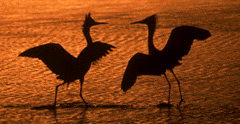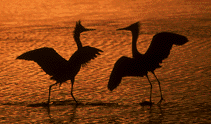|
BIRDS AS ART BULLETIN #23
GREAT MACRO TECHNIQUE; BOSQUE DEL APACHE PHOTO CONTEST; PHOTO
WEB SITES; QUOTE
Would you like to do macro photography
with the Canon 100-400mm IS zoom or the 300 mm f/4.0
IS lens? Get the new Canon 77mm 500
D Close Up Lens, which is actually a 2-element
diopter. With two-element diopters, no light is lost and
sharpness is not effected. With the 100-400 zoom, you'll be working about
13 1/2 inches from the front element of the lens at closest focus; at
400mm, this seems to yield images that are about life size.
With the 300mm IS, the numbers are just about the same. (Sorry
that I cannot give you exact magnifications, but I am no tech-freak.)
You can add a 1.4 TC and/or extension tubes for different
magnifications.
Canon has introduced a new line of these
two-element diopters to fit a variety of front element sizes. Nikon has
offered similar products for years. They are also of excellent
quality, but I believe that Canon now offers a wider variety of
sizes. Both the Canon and Nikon products will work well with any
camera system. Using the correct step-up or step-down ring
will allow you to use a two-element diopter on lens with front
elements of different sizes.
This technique will work well with any
intermediate telephoto lens, be they fixed focal length or zoom lenses.
With the fixed focal length lenses you can vary the magnification by
changing the focus. With zooms, you have greater flexibility with
magnification as you can first zoom in and out and then play with the focus.
When I spot a small flower that I
like, I simply screw the diopter onto the front of the lens, compose
handheld while zooming in and out, put the lens on a tripod, and make the
picture. It makes sense to work at the closest focusing
distance as this will give you the greatest magnification.
When there are no birds around,
this can be a lot of fun, especially when the wind is not
blowing. This technique works well also for bugs, lizards, frogs,
patterns, and other small subjects.
INFO on the 2000 Festival of the
Cranes photo contest is available at the Friends of the Bosque web page:
http://www.friendsofthebosque.org/.
As Bosque del Apache NWR
has been chosen as a focus refuge to promote the upcoming centennial celebration
of national wildlife refuges the theme for this years contest is "Scenes From
National Wildlife Refuges". Differences from previous years contest
include a) only amateurs and children can enter; b) $5 per photo entry fee for
the amateur division ( no fee for children) c) prints must be matted in white,
unframed, with a maximum matted size of 11" x 14". Prizes are currently being
finalized. (Note: prizes in the past were substantial and competition was
weak. In other words, there was money there for the taking!
AM) If anyone would like to donate a prize (tax deductible) or knows
someone who would please let me know.
Steve Ralser
(ralser@nmt.edu)
All BIRDS AS ART/Instructional Photo-Tour
particpants are urged to enter!
Surfing the web? Visit http://www.photoalley.com I found
how-to articles/wildlife and pro galleries (great features on Jim Brandenburg
and my buddy, Tim Fitzharris) most interesting, but there is lots of additional
INFO there.
Or try http://www.photo.net/ for stimulating
discussions. Click on Community/Forums/Nature and be prepared to spend a
few hours...... You can browse through old questions, or ask a new
question and hear the opinions of lots of folks, some of whom have a clue.
Consider how lucky I am to be doing the thing that I most love
to do.......
From Robert Frost's "two Tramps in Mud
Time."
My object in living is to unite
My avocation and my
vocation
As my two eyes make one in sight
Only where love and need are
one,
And work is play for mortal stakes,
is the deed ever really
done.
For Heaven and the future's sakes.
Best and great picture making to all.
Arthur Morris/BIRDS AS ART
Note: Arthur Morris has been
a Canon contract photographer since 1994 and continues in that role today.
If you received this bulletin in error, or would like your name removed
from the subscriber list, simply respond by e-mail and request
same.
| 

